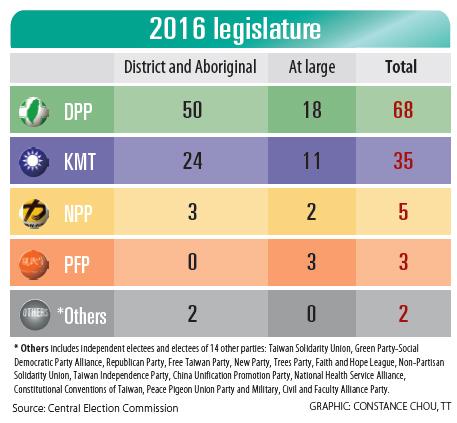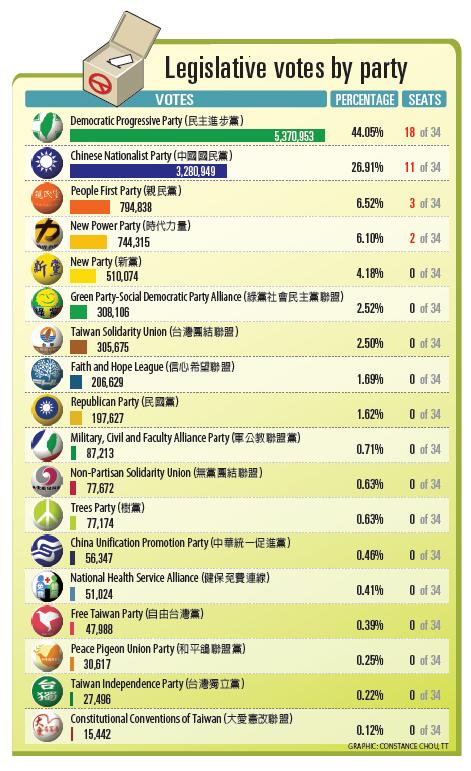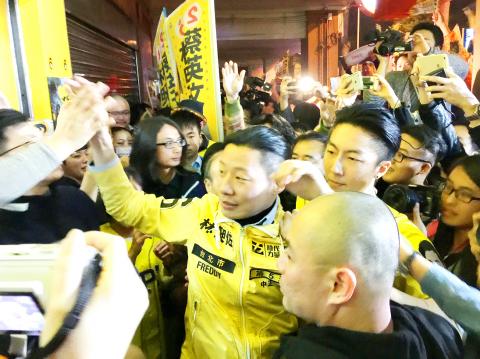The Democratic Progressive Party (DPP) yesterday won an absolute majority in the 113-seat legislature for the first time, with 60 percent of its regional legislative candidates winning in their respective electoral districts and securing more than 44 percent of the vote.
The Chinese Nationalist Party (KMT) has lost the 64-seat majority it won in 2012, retaining 35 seats in the legislature.
The newly formed New Power Party (NPP) had spectacular success, winning all three districts where it fielded regional legislative candidates and crossing the 5-percentage-point threshold to be awarded legislator-at-large seats.

Graphic: Constance Chou and June Hsu, Taipei Times
The most attention-grabbing legislators-elect are the NPP’s Huang Kuo-chang (黃國昌), Hung Tzu-yung (洪慈庸) and Freddy Lim (林昶佐), as well as the DPP’s Hsiao Bi-khim (蕭美琴) in Hualien County, who had all been predicted to have tough battles in traditional KMT strongholds.
The DPP achieved a home run in the cities and counties south of the Jhuoshuei River (濁水溪) — Yunlin and Chiayi counties, Tainan, Kaohsiung and Pingtung City — winning a total of 21 seats.
Former Taipei mayor Hau Lung-bin (郝龍斌) was defeated in Keelung by the DPP’s Tsai Shih-ying (蔡適應).

Graphic: Constance Chou, Taipei Times
In New Taipei City, which has 12 electoral districts and where KMT presidential candidate Eric Chu (朱立倫) serves as mayor, the KMT lost eight seats that it formerly held, with only two lawmakers — Luo Ming-tsai (羅明才) and Lin Te-fu (林德福) — retaining their seats.
The DPP won seven more seats than it had four years ago, securing nine seats, while the NPP secured one.
Huang, one of the leading Sunflower movement activists, defeated incumbent KMT Legislator Lee Ching-hua (李慶華), who had been elected seven times in a row, in New Taipei City’s Sijhih District (汐止).

Photo: CNA
KMT Legislator Chang Ching-chung (張慶忠), whose “30-second ramming through” of the cross-strait service trade agreement in 2014 helped spark the Sunflower movement and who was seeking his fourth term, lost his seat to the DPP’s Chiang Yung-chang (江永昌).
In Taoyuan, where the KMT had won all six electoral districts in 2012, the DPP gained three seats, while the KMT retained two and an independent won one.
DPP caucus whip Ker Chien-ming (柯建銘) snatched a seat in Hsinchu City, which had belonged to the KMT.
In Hsinchu County, former commissioner Cheng Yung-chin (鄭永金), a non-affiliated candidate supported by the DPP, was defeated by KMT legislative candidate Lin Wei-chou (林為洲).
The KMT managed to retain two seats each in Miaoli and Nantou counties.
In Taichung, the KMT won three out of eight districts — dropping from five in 2012 — while the DPP won four, with Hung winning the final seat.
In Changhua County’s four electoral districts, the DPP gained three seats, while the KMT won one, a reversal of what the two parties won in the county four years ago.
In eastern Taiwan, both electoral districts in Hualien and Taitung counties saw their respective DPP candidates elected.
The outlying islands — Penghu, Kinmen and Matsu — elected DPP, KMT and KMT lawmakers respectively.
The DPP, KMT, People First Party (PFP) and NPP were the only four parties to cross the 5-percentage-point threshold for legislator-at-large seats.
A total of 18 candidates on the DPP’s legislator-at-large candidate list secured seats with the party’s 44 percent of party representation vote.
The KMT received 11 seats through 26.9 percent of party votes.
The PFP, with 6.5 percent of party votes, won 3 seats, while the NPP garnered 6.1 percent for 2 seats.

The CIA has a message for Chinese government officials worried about their place in Chinese President Xi Jinping’s (習近平) government: Come work with us. The agency released two Mandarin-language videos on social media on Thursday inviting disgruntled officials to contact the CIA. The recruitment videos posted on YouTube and X racked up more than 5 million views combined in their first day. The outreach comes as CIA Director John Ratcliffe has vowed to boost the agency’s use of intelligence from human sources and its focus on China, which has recently targeted US officials with its own espionage operations. The videos are “aimed at

STEADFAST FRIEND: The bills encourage increased Taiwan-US engagement and address China’s distortion of UN Resolution 2758 to isolate Taiwan internationally The Presidential Office yesterday thanked the US House of Representatives for unanimously passing two Taiwan-related bills highlighting its solid support for Taiwan’s democracy and global participation, and for deepening bilateral relations. One of the bills, the Taiwan Assurance Implementation Act, requires the US Department of State to periodically review its guidelines for engagement with Taiwan, and report to the US Congress on the guidelines and plans to lift self-imposed limitations on US-Taiwan engagement. The other bill is the Taiwan International Solidarity Act, which clarifies that UN Resolution 2758 does not address the issue of the representation of Taiwan or its people in

US Indo-Pacific Commander Admiral Samuel Paparo on Friday expressed concern over the rate at which China is diversifying its military exercises, the Financial Times (FT) reported on Saturday. “The rates of change on the depth and breadth of their exercises is the one non-linear effect that I’ve seen in the last year that wakes me up at night or keeps me up at night,” Paparo was quoted by FT as saying while attending the annual Sedona Forum at the McCain Institute in Arizona. Paparo also expressed concern over the speed with which China was expanding its military. While the US

SHIFT: Taiwan’s better-than-expected first-quarter GDP and signs of weakness in the US have driven global capital back to emerging markets, the central bank head said The central bank yesterday blamed market speculation for the steep rise in the local currency, and urged exporters and financial institutions to stay calm and stop panic sell-offs to avoid hurting their own profitability. The nation’s top monetary policymaker said that it would step in, if necessary, to maintain order and stability in the foreign exchange market. The remarks came as the NT dollar yesterday closed up NT$0.919 to NT$30.145 against the US dollar in Taipei trading, after rising as high as NT$29.59 in intraday trading. The local currency has surged 5.85 percent against the greenback over the past two sessions, central